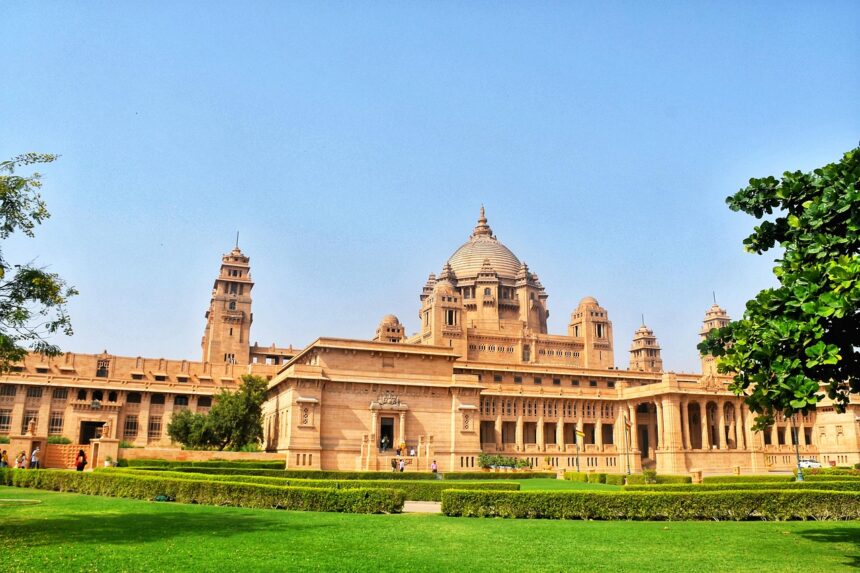Key Metrics: Rajasthan’s Political and Socioeconomic Profile
- Lok Sabha Seats: 25 (4.6% of total parliamentary seats).
- Rajya Sabha Seats: 10 (3.7% of total).
- Population: Over 81 million (2023 estimate).
- Voter Base: Approximately 55 million registered voters.
- Literacy Rate: 66.1% (Census 2011).
- Urbanization: Around 24.9%, with Jaipur, Jodhpur, and Udaipur serving as economic hubs.
- Economic Contribution: Contributes around 5% to India’s GDP, driven by agriculture, mining, tourism, and manufacturing.
(Source: Election Commission of India, Ministry of Statistics and Programme Implementation)
Introduction
Rajasthan, India’s largest state by area, holds significant sway in national politics through its 25 Lok Sabha seats. As a key battleground in general elections, the state often determines the trajectory of national parties and coalitions. With a unique blend of rural and urban voter dynamics, Rajasthan’s parliamentary representation offers insights into its evolving political strategies and priorities. This article examines the strategic importance of Rajasthan’s Lok Sabha seats, focusing on their impact on governance and electoral outcomes.
Why Rajasthan’s 25 Lok Sabha Seats Matter
1. Key Swing State in General Elections
Rajasthan’s electoral outcomes often reflect broader national trends, making it a bellwether state.
- Historical Context:
- In the 2014 and 2019 General Elections, the BJP won all 25 seats, contributing significantly to its national majority.
- The Congress’ resurgence in the 2018 state elections highlighted its ability to challenge BJP dominance, creating a competitive landscape.
(Source: Election Commission of India)
2. A Test Ground for Policy Narratives
Rajasthan’s diverse voter base serves as a microcosm for India’s socio-economic realities, making it a testing ground for national policies.
- Examples:
- Policies like PM-Kisan and Ujjwala Yojana gained traction among rural voters.
- Issues like unemployment and inflation have often dominated urban and semi-urban constituencies.
(Source: Ministry of Rural Development)
3. Strategic Importance in Coalition Politics
With 25 Lok Sabha seats, Rajasthan holds significant weight in coalition dynamics, influencing the formation of governments at the center.
- Key Role:
- Parties winning Rajasthan’s seats gain a strategic advantage in securing a parliamentary majority.
Political Landscape of Rajasthan
1. Dominance of BJP and Congress
Rajasthan’s politics remain a two-party contest between the BJP and the Congress.
- BJP:
- Stronghold in rural and semi-urban areas due to welfare policies and infrastructure development.
- Congress:
- Focuses on social justice, farmer issues, and urban unemployment to regain voter trust.
(Source: PRS Legislative Research)
2. Rural vs. Urban Voter Dynamics
Rajasthan’s voter base is primarily rural, with agriculture being the backbone of its economy.
- Rural Issues:
- Irrigation, MSPs, and drought relief dominate rural constituencies.
- Urban Focus:
- Employment, infrastructure, and education drive urban voter concerns.
(Source: NITI Aayog State Reports)
3. Emerging Role of Regional Players
While Rajasthan is traditionally a two-party state, smaller regional parties and independents occasionally influence specific constituencies.
- Example:
- The Rashtriya Loktantrik Party (RLP) has gained traction in parts of western Rajasthan.
Key Issues Influencing Rajasthan’s Lok Sabha Representation
1. Agricultural Distress and Water Scarcity
Rajasthan’s arid climate makes water management and agricultural sustainability key electoral issues.
- Challenges:
- Dependency on monsoons and limited irrigation facilities.
- Overuse of groundwater leading to depletion.
(Source: Ministry of Jal Shakti)
2. Infrastructure and Industrial Development
While Rajasthan has seen progress in infrastructure, disparities between regions persist.
- Focus Areas:
- Expanding road and rail connectivity in underdeveloped areas.
- Promoting industrial hubs in cities like Jaipur and Kota.
(Source: Ministry of Commerce and Industry)
3. Employment and Skill Development
With a large youth population, job creation and skill training remain critical issues.
- Government Initiatives:
- Programs like Skill India and state-level employment schemes aim to address unemployment.
(Source: Ministry of Skill Development and Entrepreneurship)
Challenges in Maximizing Rajasthan’s Political Influence
1. Regional Disparities
Economic and social inequalities between eastern and western Rajasthan create uneven development, affecting voter priorities.
2. Climate Resilience
Frequent droughts and desertification pose long-term challenges for governance and development.
Opportunities for Rajasthan’s Political Leadership
1. Strengthening Agricultural Resilience
- Promoting crop diversification and sustainable farming practices can address water scarcity and improve productivity.
2. Expanding Tourism and Heritage Conservation
- Leveraging Rajasthan’s cultural heritage can drive tourism, creating jobs and boosting the economy.
(Source: Ministry of Tourism)
3. Enhancing Public Services
- Investments in healthcare, education, and digital infrastructure can improve quality of life and voter satisfaction.
Expert Opinions
- Political Analyst’s Insight:
- “Rajasthan’s 25 Lok Sabha seats are a political prize for any party aiming to form a national government, making the state a critical battleground.”
- Economist’s Perspective:
- “Focusing on sustainable agriculture and industrialization will unlock Rajasthan’s full economic potential while addressing voter concerns.”
(Source: PRS Legislative Research)
What Lies Ahead?
1. Competitive Electoral Battles
With a strong presence of both BJP and Congress, Rajasthan will remain a closely contested state in future elections.
2. Addressing Long-Term Challenges
Sustainable development strategies will be essential to overcome water scarcity, unemployment, and regional disparities.
3. Leveraging Strategic Importance
Rajasthan’s leadership must use its parliamentary strength to advocate for state-specific policies and investments.
Conclusion
Rajasthan’s 25 Lok Sabha seats play a pivotal role in India’s political strategies, influencing governance and electoral outcomes at the national level. With a dynamic political landscape shaped by rural and urban concerns, the state offers both challenges and opportunities for its leadership. As parties compete for dominance, the ability to address voter priorities through effective governance will determine Rajasthan’s impact on India’s democratic framework.


Leave a Reply